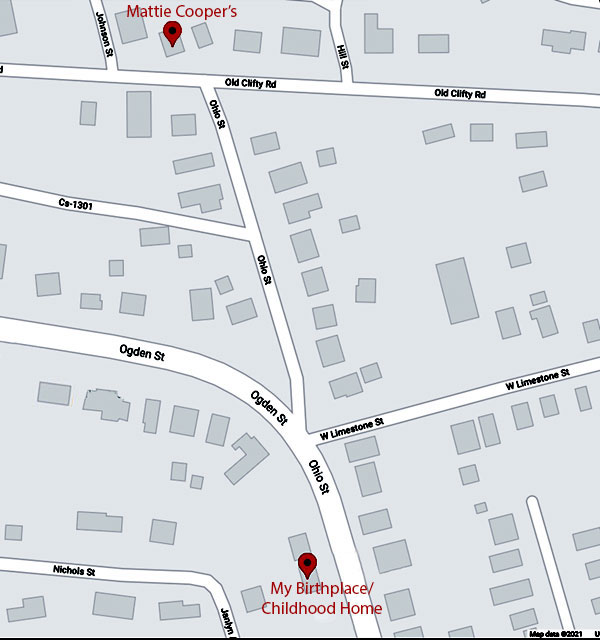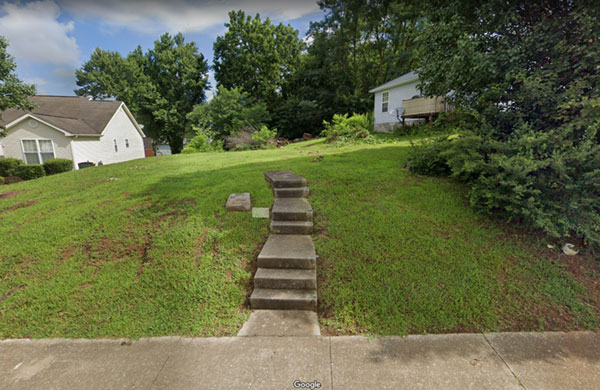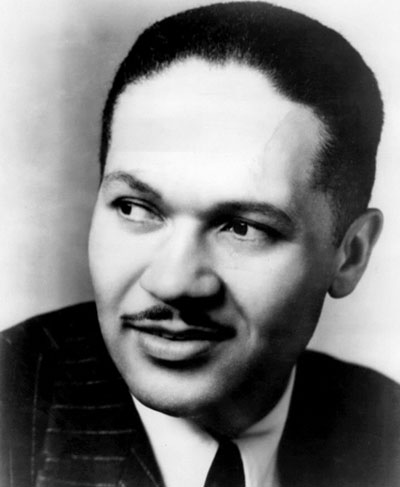HOME | FAMILY | CONDUCTING | SINGING | USU | STEINER | STANFORD | PHOTOS
26th AMENDMENT SIGNING | MEMORIES | YOUTUBE VIDEOS
Todd Duncan
As a baby and young boy, my family hired a wonderful woman to be my Nanny - look after me, change my diaper, cook for me, babysit, etc. She lived only a few houses (about 12 houses) from our house and was the most caring and loving adopted grandmother. Her name was Mattie Cooper, a dear African American woman who also worked for a local funeral home the Denney-Murrell-Ramsey Funeral Home (owned partially by my Grandfather).

Map of Ohio Street, Somerset, KY

Lot where Mattie Cooper's House Once Stood
What I didn't learn until I was an adult is that she had a daughter, Lettie Cooper Duncan who was married in Danville, Kentucky to John Duncan in 1901. She gave birth to Robert Todd Duncan in 1903. John was a garage owner and Lettie was a music teacher. Their son, Todd, was an outstanding musician and singer and was chosen by George Gershwin to premier the role of Porgy in the classic, Porgy and Bess in 1935. When Gershwin was preparing "Porgy and Bess" he stated that his ideal Porgy was a "colored Lawrence Tibbett", and was to choose Duncan after listening to over a hundred baritones. Mr. Duncan sang Porgy 124 times the first season. He went on to sing the 1937 and 1942 revivals, eventually performing his signature role about 1,800 times over his career.

Todd Duncan
(1903-1998)
He debuted in Pietro Mascagni's Cavalleria Rusticana in 1934, it was the role of Porgy which garnered him the most attention. Todd attended Butler University and earned his Bachelor's degree in music and later he earned a Master's degree from Columbia University, Teachers College. In addition to Porgy and Bess, Duncan was the first performer for the role of Stephen Kumalo in Kurt Weill's Lost in the Stars.
Duncan taught voice at Howard University in Washington, D.C. from 1930 until 1945. While teaching at Howard, he continued touring as a soloist with pianists William Duncan Allen and George Malloy. A busy recital singer throughout his life, he is said to have performed around 5,000 concerts in 56 countries. He also was featured in two film roles and was in constant demand as a baritone recitalist.
In 1945, he became the first African American to sing with a major opera company, and the first black person to sing in an opera with an otherwise white cast when he performed the role of Tonio in Leoncavallo's Pagliacci with the New York City Opera. In the same year, he sang the role of Escamillo, the bullfighter, in Bizet's Carmen. In 1954, Duncan was the first to record "Unchained Melody", a popular song. The recording was made for the soundtrack of the obscure prison film, Unchained, in which Duncan also played a minor character. Following Duncan's version, the song went on to become one of the most recorded songs of the 20th century.
In 1978, the Washington Performing Arts Society presented his 75th birthday gala. Duncan was awarded the George Peabody Medal of Music from the Peabody Conservatory of Music of Johns Hopkins University in 1984. Other awards he received include a medal of honor from Haiti, an NAACP award, the Donaldson Award, the New York Drama Critics' Award for Lost in the Stars, and honorary doctorates from Valparaiso University and Butler University.
Although I never met Todd Duncan, I feel like I was influenced by his musical excellence because of his wonderful grandmother.
For more information about Todd Duncan, click here.
